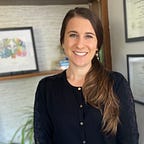Innovating Early Childhood Education: A Triad of Expertise
In the dynamic landscape of early childhood education, an innovative collaboration between child development professionals is set to reshape the way we nurture and support our youngest learners.
Meet Sequential Development Consulting (SDC). Their mission is to bring the expertise of early childhood mental health clinicians, pediatric occupational therapists, and pediatric speech and language pathologists into the world of early childhood education. A one-stop shop for comprehensive child development support. Not individual therapists in the classroom focusing on one child, but a team of child development professionals partnering with the entire teaching staff; the client being the entire classroom.
At the heart of this model is the Neurosequential Model of Therapeutics (NMT), providing the scientific foundation that informed the theory of change behind SDC’s mission. In this article, we discuss the collaboration efforts between these overlapping fields of child development and education.
A Scientific Framework
SDC’s approach is grounded in NMT, developed by Dr. Bruce Perry. The principles of NMT informed SDC’s theory of change, as well as their assessment and support processes. NMT acknowledges that in order for a child to access the cognitive area of their brain (for example, learn their ABCs), they must have a strong foundation of sensory integration, self-regulation, safe relationships, and communication skills. Further, NMT considers the resiliency-building process in young children, as well as the sequential development and organization of the brain, which are guiding principles for SDC.
Why Integration Matters
The integration of early childhood mental health, pediatric occupational therapy, and pediatric speech and language pathology ensures that early learning centers can provide holistic developmental support. This goes beyond isolated interventions (i.e. a child attending OT 2x/week in an office setting, or SLP for 30 mins, 2x/week), and addresses the entirety of a child’s developmental journey in the setting where they are spending the majority of their day, and the majority of their week. Can you imagine how much more naturally (and quickly) a child would learn if the skills they are taught in their individual therapy sessions were integrated into their 8 hour school day, supported by the people they spend the most time with (teachers)? It’s important to note that these skills are not only beneficial to children that might show early signs of a delay or difference, these are essential skills that benefit every child, and, in a way, cover the bases, making sure important aspects of development don't get left behind.
The Blueprint
Collaboration among the three professionals leads to an assessment of and recommendations for the preschool environment as a whole. A sort of blueprint for early learning centers to create environments that optimize opportunities for social-emotional learning, sensory and motor development, and speech and language skill acquisition over the course of the children’s day at school.
Empowering the Real Heroes- The Educators
SDC aims to empower early learning center staff by arming them with support, knowledge, and confidence. SDC believes in the importance of annual professional development training that covers a wide variety of topics from the fields of speech and language development, sensory and motor development, and the development of social-emotional skills for children aged 0–5. When educators have the tools to respond to children’s diverse developmental needs effectively in the classroom setting, the overall classroom environment is more harmonious, inspiring, and productive (i.e. less challenging behaviors). A more harmonious work environment is better for a teacher’s (and a child’s) stress levels; less stress equals less burnout and more genuine connection, presence and learning.
Additionally, educators have access to the mental health clinician, speech and language pathologist, and occupational therapist for professional consultation, on demand. Teachers can troubleshoot and process issues that come up in the classroom, an incredibly helpful way to support our teachers on the front lines of educating our community of little ones.
Why Families are Excited About this Collaboration
Throughout the day, in the preschool or childcare setting, through exposure and repetition, children develop essential social-emotional skills, sensory integration skills, motor skills, and speech and language skills, fostering resilience and cognitive growth. When families know that their child’s preschool is an SDC Member School, they feel more confident in their children’s educational experience, knowing they are in a developmentally and biologically respectful environment.
This is the kind of environment that any parent would want for their child. In fact, the SDC project was founded for this very reason–a parent looking for a preschool that would support their child’s development holistically, covering all of the essential areas.
That peace of mind is priceless.
